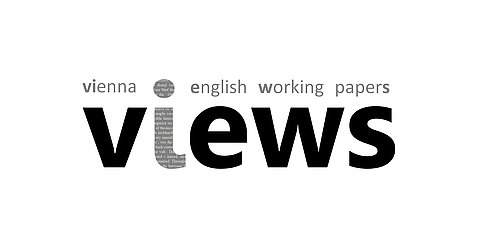VIENNA ENGLISH WORKING PAPERS is a journal produced at the English Department of Vienna University. In its printed form, it has been going since 1992.
When we called our working papers VIEWS, this was meant to be an operative word, reflecting the intention to produce not so much finished papers as comments and opinions open-ended enough to provide a forum for discussion.
The principal reason for this was personal. We represent a group of linguists working in a variety of different areas of enquiry, and we realised that as long as each of us was staying within the boundaries of our respective 'research programmes', we didn't have much to say to one another. The 'nice' and 'finished' papers each of us produced to get them published in appropriate journals or conference proceedings were typically neither noticed, nor reacted to by anybody else within our department. During coffee breaks and lunches we preferred to talk about the weather, the family or the latest computer virus. But when linguistic matters came up, our conversation remained sadly superficial: 'Congratulations on your book ... hard luck, try another journal ... glad to hear your talk was well received'. What we actually SAID in our papers, talks, books was hardly ever taken up seriously. And of course, we had our excuses. After all, we were all working within different paradigms, and had different problems to solve. It was easy, then, to slip into the error of thinking that we didn't have anything to say to and learn from each other. Why should a sociolinguist quarrel with a semanticist, what does the phonologist have to do with the discourse analyst, why should the historical philologist talk to the syntactitian? Moreover, like everybody else, we were probably afraid of criticism, frightened of argument and anxious not to lose face. So, for much too long, we preferred to stay put within our safe little compartments, each of us working our own scene, and each of us getting more and more uncomfortable about it. So, we decided to launch the VIEWS project, getting us together to talk, challenge each others' ideas, profit from each others' insights and establish some sense of community.
This isolation that we wanted VIEWS to remedy, was, we felt and still feel, mirrored in the state of the linguistic community as a whole. There seems to be a general tendency to diversify and to create more and more ever smaller ecological niches in which ever more hermetic types of discourse have settled into dull vegetative stability. Linguists co-exist peacefully, quietly, uncontroversially as individual scholars, while at the same time their community seems to be falling apart, with fewer common concerns to bring them together.
Therefore, we believe that VIEWS was not just what our department needed to get its members to talk to each other, but that it represented very much what the linguistics community as a whole seems to require: open dialogue as opposed to finished monologue.
But the conventions we wanted to challenge are, we discovered, extremely influential, and over the first four years of our publication there had been a tendency towards the very completed and closed papers that it was our intention to avoid. In other words there was a tendency to revert to type. We felt therefore that some editorial intervention was called for to get us back on track. So as to better foreground the process of academic discussion that we feel is so necessary for all of us.
With this in mind, we have decided to change our editorial policy. Instead of the usual practice of editing behind the scenes we decided to take up the challenge of making overt and explicit the process by which ideas/theories are developed through critical interaction, and this can be said to be an exercise in open editing. We want to try out what it means to be a genuinely interactive forum which attributes equal importance to both writing and reacting. What this means is that comments from members of the editorial board on particular contributions will be put in print, and in turn be open to critical comment.
We should like to invite you to join us in this experiment, and this has implications for the kind of contributions we would like to attract. The emphasis now will be on CONTRIBUTIONS. These might indeed be short papers of the conventional kind, but could also be ideas, notes, arguments, questions, attacks or responses, which could be anything in length from one pithy paragraph to a few pages.
This is therefore NOT a call for PAPERS in the usual sense, but for CONTRIBUTIONS in the sense we have outlined here.
We would like to follow the policy, then, of reflecting the process rather than the product of scholarly inquiry. In short, we want to avoid the danger of VIEWS becoming an organ of the 'Dead Linguists' Society'. So we would like to invite your participation in this project. Please send your CONTRIBUTIONS [sic!] to
VIEWS c/o
Institut für Anglistik & Amerikanistik der Universität Wien
Universitätscampus AAKH, 8. Hof
Spitalgasse 2
A-1090 Wien
Austria
Note to authors:
Please format your submissions according to our Style Sheet and add an abstract of 250 words (maximum), followed by 5 keywords.
Department of English
Universität Wien
Campus d. Universität Wien
Spitalgasse 2-4/Hof 8.3
1090 Wien
Austria
T: +43-1-4277-424 01
F: +43-1-4277-9424





